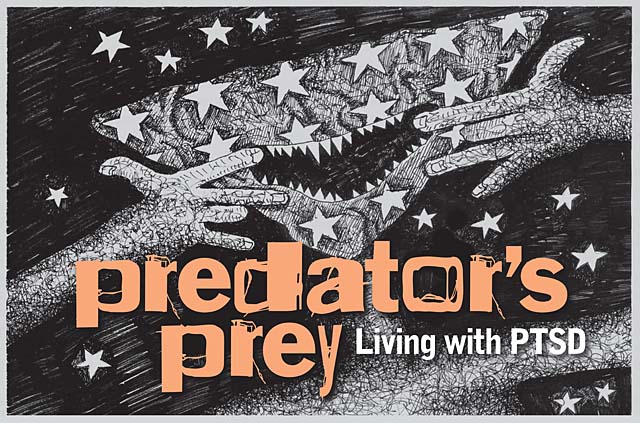 |
|||||||||
|
January/February 2014
BY ROBIN TOWER
In boot camp I was physically held down and sexually assaulted multiple times. Thirty years later I got service connected for PTSD. This is my story. In 1950 I was born into a blue-collar Appalachian family. At six weeks of age I was handed over to my Mennonite grandparents to be raised.
We lived with cold running water and an outhouse. No TV; just an old RCA tube radio to listen to the livestock report from 7:00 to 7:10 each morning. I lived a life totally sheltered from the outside world. When I was ten I was introduced to the Boy Scouts by a neighbor boy; as soon as I was old enough, I joined. Our scoutmaster was a retired Coast Guard chief boatswain mate, and our troop was run like a military ship. We won lots of blue ribbons for our performances, and his campfire stories captivated me. In 1968 I joined the Coast Guard, gung-ho as could be. I was given clear advice about boot camp: Line up in the middle, do as they say, and don’t volunteer for anything. Sometime near the middle of boot camp I was called to the NCO’s quarters shortly after Lights Out. Reporting in a tee shirt and boxer shorts, I stood at attention. “Sir. Yes, Sir.” “At Ease,” he said, and told me to have a seat. There was only one chair, a desk, and a cot. He was sitting in the chair, so I took a seat on the cot. It was “Good Cop, Bad Cop” time. He told me he was not like the other, hard-ass instructor. He told me that he had noticed me having a tough time at the rifle range that day and he was sorry for that. He called me by my first name and, using her first name, asked how my mother was doing. He asked if she had been writing to me. He had read my personnel file. Approaching me, he told me to lie down on the cot and he’d give me a little massage that would help me relax and feel better. As I lay face down, he started on my shoulders, then down my back and legs. He told me to roll over. He kneaded my shoulders, down my chest to my waist, to the inside of my thighs. My anxiety grew. I knew this couldn’t be right. I sat up, and that’s when he put his hand in the middle of my chest and pushed me back down, leaned into my face and said, “Just go along with this and everything will be alright. “You yell or make a sound, and I’ll call the security and tell them you came in here, went crazy, and threatened me. Who do you think they’re gonna believe? “You’ll end up in the Red Hats, doing hard labor. I am a very powerful man in the Coast Guard, and I can find you anywhere you are stationed. Anytime I want to.” As he continued threatening me, my breath got shorter, my chest got tighter. I feared for my life. As he slid my boxers down, I checked out. It was like I was standing there watching what went on.
I grew fearful of Lights Out and would break into a sweat when I heard the metal door to his quarters open, pause, and close. Then came the footsteps of the security on the hard tile floor, coming down the hall. With a flashlight, he checked the names on our seabags. When he got to mine, he stopped and gave my bunk a shake. “The NCO wants to see you in his quarters.”
How many times, I can’t rightly say. I blocked out more and more as time went on. My memories of the remainder of boot camp are spotty.
I asked one of the guys if he had ever talked to the chaplain. He said, “Who’d want to talk to that faggot?” I figured the chaplain and the NCO were probably buddies, and if I told him, he would more than likely tell the NCO. I was trapped.
On Graduation Day as we passed in review, all the faces in the bleachers were blurry except the NCO’s smirky grin. After Engineman School I took leave, went home, and married my high school girlfriend. I was assigned to an icebreaker, where I overheard a couple guys talking about the NCO. About how he’d gotten busted, sent to a mental hospital, and discharged.
Aboard the icebreaker, whenever we were at sea I had chronic motion sickness. Once I went twenty-eight days without a meal, living on saltines and dry heels of bread. I suffered malnutrition and attempted suicide.
Upon returning from the five-month cruise in the North Atlantic, I walked straight off the ship, went to the Fifth District Headquarters, and into the XO’s office without knocking. Violently angry, I quit the Coast Guard. I was picked up and taken to the hospital for mental evaluation, diagnosed as Unfit for Military Duty, and given two large bottles of meds: one of Thorazine and one of Phenobarbital. Three months later I was honorably discharged and returned to society. In the middle of it all my wife said I had gotten too crazy, so she moved out and filed for divorce.
Returning home in uniform, of course, there was no welcome home party. Instead I had things thrown at me and was called names. You all know this part of the story. We were in the heat of the Vietnam War, and I was a serviceman. I took off my uniform, put it in my seabag, and threw it in a dumpster. I let my hair and beard grow, started doing drugs, and joined the hippies. I was angry at the world, but—sad to say—didn’t know why. I started fighting anyone and everyone. Even with a shotgun in my face, I wouldn’t stop. When I saw Lt. Dan in Forrest Gump, in the scene on New Year’s Eve with the whores—that was it, that was how I felt. Just like that. No wheelchair, but a violent, angry fire burning inside me. And not knowing why. A friend collared me, said, “You need help,” and directed me to the VA hospital in Salem, Virginia. I took his advice and went. I told them I was really messed up from my time in the service. I didn’t know what was wrong or why, but I needed some help. They ran me through a routine exam, but they never asked the Big Question. I was turned down for service connection, given a form, and told I had a year to submit evidence to support my request. My anger boiled. I was a mess. And I didn’t know why.
I just wanted to go away and hide. I was running, trying to get away from it all, when I ran into an old friend. He showed me a place up in the mountains beside a creek, where I could build myself a camp. He introduced me to Native American spiritual ways and the sweat lodge. We built one and did the best we could to use it correctly. He left town, and another friend visited. When she saw how I was living in my makeshift lean-to shelter, she gave me a book about a Native American medicine man named Rolling Thunder. I wintered in that mountain hut. Come spring I packed a backpack and left West Virginia without a word. I hitchhiked to Carlin, Nevada, to find Rolling Thunder. I joined Meta Tantay, his camp for people wanting to learn about the spiritual ways of Native Americans. He gave me a new outlook on life, and to this day I practice his teachings of the sweat lodge, smudging, praying, and the tobacco offerings. I hitchhiked around the country for a couple of years, returning to Meta Tantay several times, then returned to the hut by the creek in West Virginia. I met a lady who gave me a book about a mountain man who lived deep in the wilderness on the Salmon River. I read the book, and (you guessed it) packed my pack and hitchhiked to Idaho, picking up a VW van on the way.
I moved into an old abandoned cabin just across the river and up from the old Mountain Man. Two and a half years later I came out with a wife and started a family. After twenty years my anxiety finally became too much for the marriage to withstand. We went to counseling. On our second visit the therapist convinced me I was the one with the problem, not my wife.
My therapist set up some one-on-one sessions. She works mostly with vets and is very involved in Native American spiritual ways, so we connected right from the start. On the third visit I walked in and saw an American flag folded in a triangle, lying on her table. She said it had been given to her. Something inside me clicked. I broke down and started this deep, grieving cry. Once I could breathe again, she asked me about my time in the Coast Guard and then the Big Question: “Have you ever been sexually assaulted?” I didn’t have to answer, she could see it on my face. She was the first person I had ever told. After hearing my story of boot camp, she picked up the phone, called the VA hospital, asked for the psychiatrist by name, and told him she was sending a vet in for an exam. She wrote a note, sealed it in an envelope, and told me to tell him exactly what I had told her. Looking at me she said, “I think we have found the reason for your anxiety.”
The psychiatrist sent me home with two kinds of meds and scheduled me to see my therapist on a regular basis. She recognized that the assault had had a debilitating effect on my relationships and told me I should try to get service connected for PTSD. That was the first time I had ever heard of PTSD. Validation for my sexual assault had begun. After five years of paperwork, I got service connected for PTSD.
Actual panic has largely faded away. The intensity of the distress is gone, making the remaining memories mere shadows of the original traumas. There are things that still trigger me, such as being inside government buildings like courthouses, hospitals, post offices; hearing footsteps on hard floors; and perhaps the worst: being called by my first name. It still takes work, but I am lots better than I was. The Great Spirit and several people have either saved my life or helped me save it:
Although my wife and I are separated physically and legally, each continues in tremendous support for the other and for our two sons.
|
|||||||||
|
|
|||||||||
8719 Colesville Road, Suite 100, Silver Spring. MD 20910 | www.vva.org | contact us |
|||||||||









